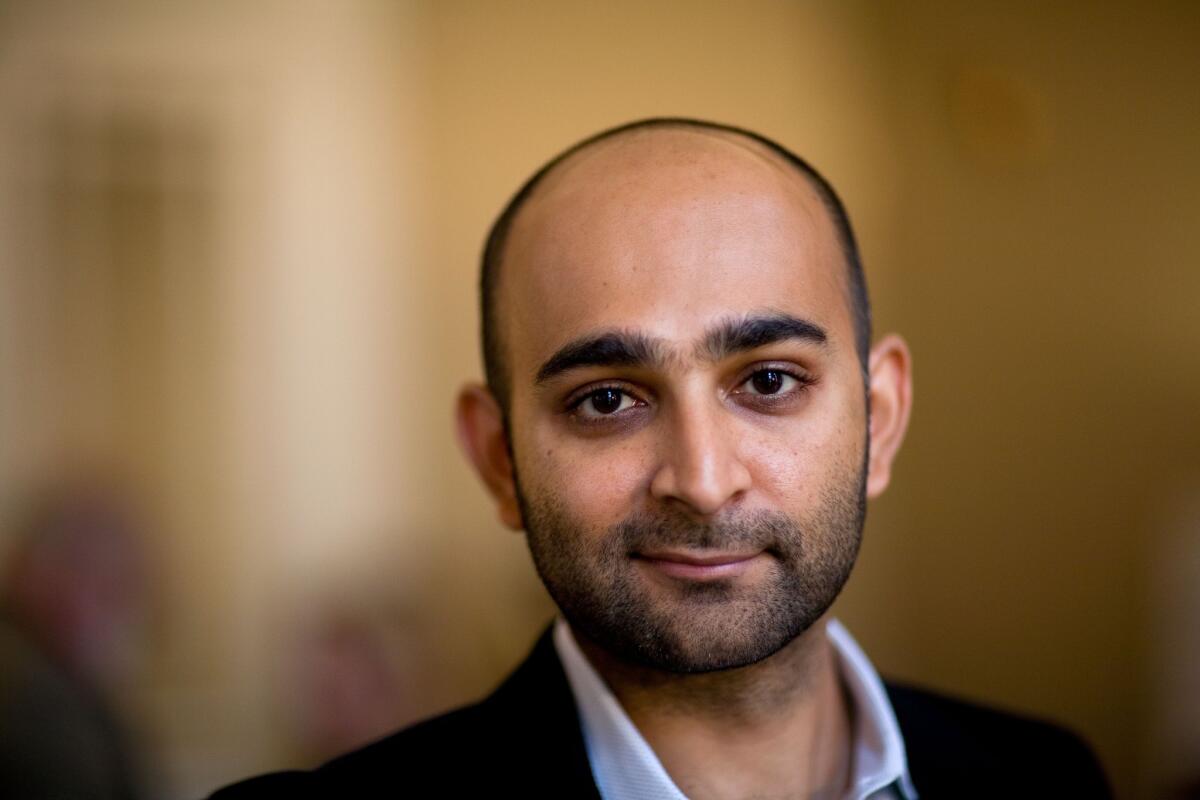Review: Mohsin Hamid’s new book takes a post-9/11 view

- Share via
Writers, Lynne Sharon Schwartz once insisted, write “anything and everything, just as a composer composes anything — not only sonatas or only nocturnes or only symphonies.” And yet, it’s undeniable that certain authors are better at certain things. For every George Orwell, equally adept at nonfiction and the novel, there’s William Gass, whose fiction falls as silent to me as his essays sing.
Such issues inevitably arise in regard to “Discontent and Its Civilizations: Dispatches from Lahore, New York, and London,” the first book of essays by Mohsin Hamid. Gathering 30-some pieces originally published in venues such as the New York Times, the Guardian and the New York Review of Books, it is, as it must be, something of a grab bag, a series of impressions largely drawn from the years following 9/11.
Hamid is a deft and fluid novelist, unafraid to take on big topics. “The Reluctant Fundamentalist” (2007) tells the story of a westernized Pakistani who must rethink his values, his orientation, in the wake of the war on terror, whereas his 2013 novel “How to Get Filthy Rich in Rising Asia” explores globalization and ambition in the saga of a young tycoon.
These books grow out of a wide array of influences, literary and otherwise; “The Reluctant Fundamentalist” is modeled in many ways on Albert Camus’ “The Fall.” Like Camus, Hamid has more on his mind than mere storytelling — he is looking to use fiction to get at the essential narratives, political, cultural and existential, that we all must navigate in the confusing, and often dangerous, mash-up of the modern world.
This mash-up is at the center of “Discontent and Its Civilizations” also, which is broken into three subsections: “Life,” “Art” and “Politics.” The title — and it is a terrific title, a knowing and playful riff on Sigmund Freud — comes from an essay that argues not for the clash but the confluence of cultures, an inevitability Hamid embodies at the core.
Born in Pakistan, he spent part of his childhood in California and was educated at Princeton and Harvard Law School; he subsequently spent years in New York and London before moving back to Lahore. In the title essay, he describes his decision to buy “blast-resistant film” for his daughter’s bedroom window, explaining, “I did not wonder if they were made by factories in the West, by workers who were Muslim, by both, or by neither. No I wondered instead if such films were truly transparent. For outside my daughter’s window is a tallow-blooming amaltas tree, beautiful and mighty, and much older than us all.”
That’s a novelist’s detail, used here for both metaphoric and political effect. What does it matter who makes the film, Hamid is asking, as long as his daughter is safe? And not only safe but able to see beauty amid the danger and the violence?
We’re not accustomed to considering Pakistan with such subtlety, at least not in the United States. As such, “Discontent and its Civilizations” is at its best when Hamid takes time to deconstruct our preconceptions, as in the long essays “Why They Get Pakistan Wrong” — which reminds us that “[t]he country’s annual death toll from terrorist attacks rose from 164 in 2003 to 3,318 in 2009, a level exceeding the number of Americans killed on September 11” — and “Why Drones Don’t Help,” with its explication of the blowback provoked by our policies.
“To turn on one’s TV’s in Pakistan is to find oneself entering a world permeated with conspiracy theories,” he writes, before turning the argument on us: “Conspiracy theorists have numerous examples they can cite in support of their positions. But perhaps none is as emotionally potent as the claim that flying robots from an alien power regularly strike down from the skies and kill Pakistani citizens. In the U.S., such a claim would be science fiction or paranoid survivor cultism of the furthest fringe-dwelling kind. In Pakistan, it is real.”
There’s the novelist again, writing with complexity and nuance, holding two opposing ideas in the mind. Still, such a posture ultimately gets diluted by the ephemeral nature of many of these essays, particularly in the Life and Art sections, which are composed largely of op-ed type pieces that end too quickly to engage us as they could. A reflection on Haruki Murakami and his love of running peters out without much of an argument; so too, a brief reflection on the transformative effects of fatherhood, which slips into the territory of cliché. These and other pieces lack the weight, the staying power, required by a collection such as this.
The point of “Discontent and Its Civilizations,” after all, is to make a case for the way big issues unfold across individual lives. And yet his intent is not to trace the evolution of the war on terror but how it alters us on the most intimate terms.
“The self we create,” he notes, “is a fiction. On this point, religion and cognitive neuroscience converge.” So too I might add, the novel and the essay, although not quite successfully in this collection, which cannot fully straddle that divide.
Discontent and Its Civilizations
Dispatches from Lahore, New York, and London
Mohsin Hamid
Riverhead: 226 pp., $27.95
More to Read
Sign up for our Book Club newsletter
Get the latest news, events and more from the Los Angeles Times Book Club, and help us get L.A. reading and talking.
You may occasionally receive promotional content from the Los Angeles Times.







